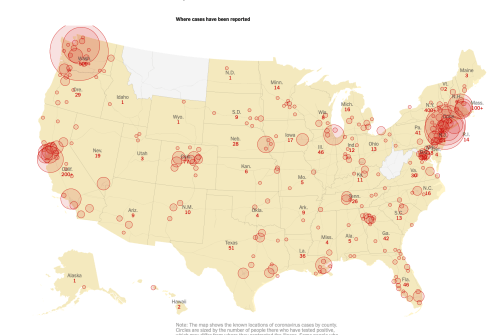
This is part of an amazing series created and generously shared by Ricardo Levins Morales for this time of crisis. Check out the whole series on his Facebook page and at his studio https://www.rlmartstudio.com
Coronavirus news and misinformation spreads farther and faster than the virus itself. You could spend all day in complete social isolation, just trying to separate the science from the silliness. Luckily, you don’t have to tackle that alone. Here are some resources and ideas for coping with coronavirus, while remembering and acting as part of a community.
“But I’m Not at Risk”
Some great advice from Huy Hong, who says it better than I can:
- “This is less about avoiding contracting the disease yourself, but to prevent spreading it to older/at-risk individuals e.g. parents. You’ve all read the news that younger people are less likely to fall ill/show signs. You can still transmit the virus though. And older/at-risk individuals will fall gravely ill….
- “It’s gonna suck for parents far more than it’ll suck for the rest of us, especially if they have to reduce/stop time interacting in real life with the grandkids. So call/FaceTime them far more frequently than you normally would (we should all do this more in general)….
- “I know this can all feel annoying and unnecessary but going out less and being more mindful about what you touch is far easier than dealing with someone you love dealing with this disease.”
Information
A great Google doc maintained by Emma Hartung, COVID-19 Mutual Aid & Advocacy Resources, “is meant to be a resource for people looking to take care of themselves and their communities through personal preparation, collective care, mutual aid and advocacy.” Sections include What’s Happening, What We Can Do About It, and Look Out For Each Other. This resource includes links to solid, factual information, and also advice and links to information about advocacy and mutual aid.
Yes, wash hands, stay home, avoid infection. That’s basic, but we can and must do more.
We can help one another: the neighbor who needs groceries, the grandma down the street who needs someone to check on her or drive her to the doctor, the co-worker who needs a shoulder to cry on when her mother falls ill.
We can advocate for justice in the midst of this crisis: for homeless people sheltering in conditions that make them particularly vulnerable to infection, for prisoners who can’t get even get soap, for immigrants forced into close contact in courtrooms and detention centers.
Two resources for advocacy and organizing are the Coronavirus Resource Kit and How to Neighborhood Pod.
If you are obsessively tracking the coronavirus spread, you’ll want to bookmark the New York Times map, which tracks all the cases in the United States. Here’s what it looks like tonight:

Misinformation
Should you hold your breath to self-diagnose? Wear a mask every time you leave the house? Gargle with bleach? No, no, and NO!!! To track these and other bits of phony advice floating around the web, go to Snopes.com and FactCheck.org.
Seriously, beware of phony news and advice.
Caring for Community and Neighbors

This is part of an amazing series created and generously shared by Ricardo Levins Morales for this time of crisis. Check out the whole series on his Facebook page and at his studio https://www.rlmartstudio.com
Mia Mingus has a great Facebook message, that reads in part:
“This is a moment to be in solidarity with folks who do not have the luxury to choose and whose risk relies on those of us who do.
“This is a moment to dig deeper into how we put our value of interdependence into practice and action. This is not time for theory.
“We need each other.
“Reach out to folks in your life and check up on them. Share your resources. Support mutual aid for all the many, many folks/communities who need it right now or start one where you are. Organize. Share reliable information. Support China Towns. Cook food for people. Wash your hands often for 20 seconds with soap and water.
“Focus on what you *can* do, even if it feels small. The small is important. We need the small in order to fight the big.
“We need 300+ million people to do small things.
“If you can ALSO do big things, that is great. We need that too.
“The key is that we need everyone to do what they can RIGHT NOW. Small and big. Know that your small act is part of a larger force that is rippling out.”
A few small things:
- Offer to help by picking up groceries.
- Donate to your local foodshelf.
- Bring a bag of groceries to someone you know who needs help.
- Stay in touch, especially with people who are feeling particularly alone because of age or health conditions that keep them isolated.
As I put this post together, I have been humbled and inspired by the caring and consistent work that people are doing to fight against emotional and political isolation and instead to keep us moving together, in community, even if we must be physically separated. We will not fail one another.

This is part of an amazing series created and generously shared by Ricardo Levins Morales for this time of crisis. Check out the whole series on his Facebook page and at his studio https://www.rlmartstudio.com
Discover more from News Day
Subscribe to get the latest posts sent to your email.


Great resource, thanks Mary. (Scott)
LikeLiked by 1 person